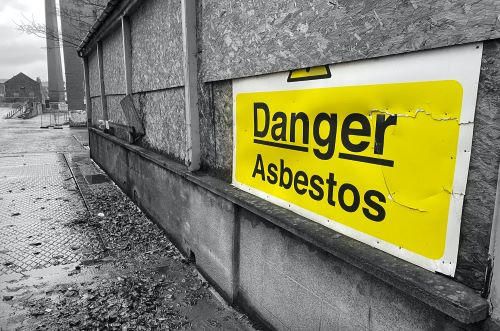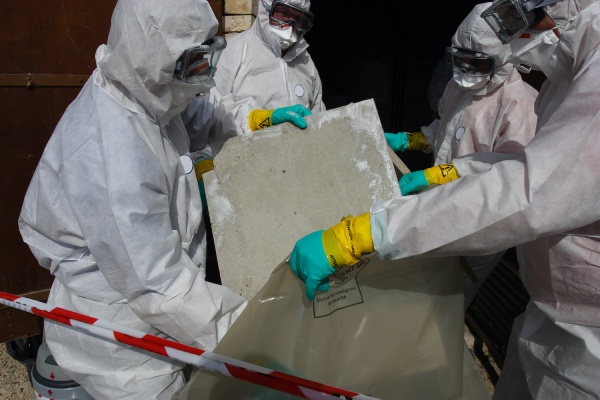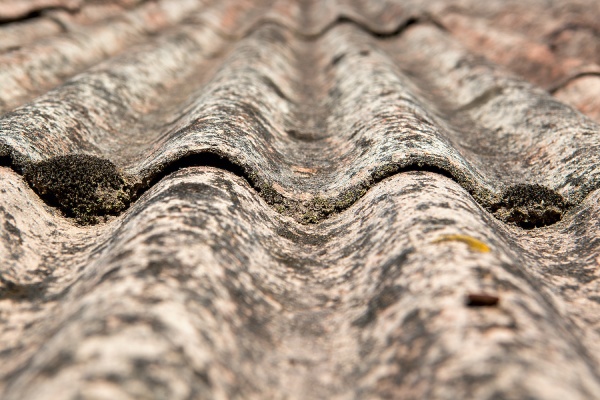
As premiums continue to soar in the insurance high risk sector, we thought we would investigate certain fields and see what factors push premiums to levels they are reaching. Let us start at the beginning of the alphabet with an A for Asbestos. Asbestos liability insurance is a hard market whether you are a new start up business or require asbestos insurance for a company that has been trading for 3 years +.
Over the year’s insurers have had large pay-outs due to claims from contamination and death from employees or third parties being exposed to the deadly asbestos fibres. Due to this and the situation always being high risk asbestos insurance remains up there with some of the highest premiums being paid in the insurance market, whether it be public liability for non-licenced asbestos insurance or licenced asbestos insurance.
Lets take a look at asbestos and where the risk lies:
Asbestos is a naturally occurring mineral. There are six types of asbestos, all of which are long and thin fibrous crystalsthat can be released into the atmosphere by abrasion and other processes. Asbestos is an excellent electrical insulator and is highly heat-resistant, so for many years it was used as a building material within houses and outdoor garages.
However, it is now a well-known health and safety hazard as the inhalation of asbestos can lead to many long-term illnesses such as asbestosis (a lung disease) or Mesothelioma (asbestos caused lung cancer) which there is no cure for these and is expected that up to 100,000 people a year are thought to die from diseases relating to asbestos exposure.
Comparing this to construction workers there was only 5,333 deaths in 2019 meaning there was 20 times more deaths due to asbestos related deaths per year. The long-term health factors of asbestos make the asbestos market a very high-risk sector for asbestos business insurance.
Where is asbestos used?
Due to the physical properties in asbestos, in many houses up until the 1970’s asbestos was used as a building material to strengthen and fireproof buildings, however within recent years and new technological discoveries the hazardous side has been pointed out and many people realising the health consequences and this means many buildings contain asbestos that needs to be removed.
Asbestos Removal/Abatement is a commonly used way to remove asbestos and release asbestos containing fibres. Despite the health hazard known to millions, many developing countries still support the use of asbestos mining and the use of asbestos as a building material with Russia, Kazakhstan, China, and Brazil all mine asbestos and between these 4 countries over 2.26 million metric tonnes of asbestos was mined in 2019 but since then this number has dropped to 1.09 million metric tonnes.
This shows in developing countries how vastly used asbestos is worldwide despite the health hazards that are known.
What are the different types of asbestos?
Many people will either class asbestos as ‘licensed’ asbestos, ‘non-licensed’ asbestos, ‘notifiable’ or ‘non-notifiable’ asbestos. This is the brackets for asbestos however many people are unaware that there are 6 different types of asbestos. The types of asbestos that everyone can look out for on a day-to-day basis in their sheds, garages and basements are the following.
- Chrysolite, (white asbestos) is the most common found asbestos and was the most used form of asbestos when building houses in the 40’s, 60’s and 70’s. This type of asbestos can be found in roofs, walls and ceilings.
- Amosite, (brown asbestos) is often found within external building works such as cement sheets and pipe insulations. It can also be found in insulating board, ceiling tiles and thermal insulation products.
- Crocidolite (blue asbestos) was originally commonly used in steam engines however was used within the building trade in pipe insulation due to its heat and fire-resistant properties, plastics and cement products due to its strength in form.
- Anthophyllite (green/grey asbestos) is used and often found in construction materials and is used in ‘talc’ sometimes referred to as baby powder but is classed as not hazardous or dangerous type of asbestos.
- The last two types of asbestosare Tremolite and Actinolite (green/grey asbestos) , these are not used commercially in buildings and are lot less hazardous and dangerous which for horticultural use mainly.
Why do I need to know the different types of asbestos?
 Making sure as an asbestos worker, that you understand the different types of asbestos is a crucial part of your job, as if you wear minimum PPE for the stronger and more hazardous asbestos such as Chrysolite, this can leave yourself and your employees exposed to asbestos particles, which will not affect your health straight away, but the coming years can affect your respiratory system, and as previously mentioned can lead to potentially fatal diseases such as asbestosis or Mesothelioma.
Making sure as an asbestos worker, that you understand the different types of asbestos is a crucial part of your job, as if you wear minimum PPE for the stronger and more hazardous asbestos such as Chrysolite, this can leave yourself and your employees exposed to asbestos particles, which will not affect your health straight away, but the coming years can affect your respiratory system, and as previously mentioned can lead to potentially fatal diseases such as asbestosis or Mesothelioma.
When you insure your company for asbestos work it is crucial to understand the type of asbestos work you will be working on, if you note down the wrong type of asbestos when insuring yourself, this can make your insurance invalid in the event of a claim and can leave you, your employees, or your business at risk of serious health hazards, with no pay-out for your business.
Why is it so important to have the right Asbestos Liability insurance in place?
There are the many different types of work that asbestos can involve, ranging from surveying and testing to the removal and disposal of the asbestos, the work can also include management and consultancy and making sure you have the correct and relevant insurance in place is crucial to make sure that you are covered for all of your business activities, many asbestos workers have the standard Public Liability and Employers Liability, however for certain asbestos tasks such as surveying, consultancy and management it is also a good idea to get covered for asbestos professional indemnity insurance.
This will cover you for any negligence or professional advice or mistakes you make when undergoing surveys. The surveys are used to find out exactly what type of asbestos any potential client has, this can then be approached in a way to remove the asbestos safely and professionally to ensure that the house/garage/building is safe for people to work in where there is none / extremely little amounts of asbestos fibres.
The health and safety of your business, employees and clients should always come first, however having the correct insurance in place and understanding your asbestos insurance policy in depth can be that extra piece of information you may need, to make a client feel confident and happy with your service.
The cover you may need:
- Public Liability for asbestos insurance – covering you for any damage to any 3rd party property you may undertake work on, this could be something as simple as a damaged interior wall which needs repairing, or something more serious such as a wall collapsing and falling on top of someone. This piece of insurance is a legal requirement, and you can get cover ranging from £1,000,000 or you could have higher amounts of indemnity ranging from £2,000,000. £5,000,000 or £10,000,000 if your company is larger and will undertake larger contracts.
- Employers Liability for asbestos insurance– This cover is also a legal requirement for any company who employees 1 person or more (not applicable to sole traders) and covers your business for compensation costs if an employee becomes ill or injured because of the work that they undertake. This can result in compensation claims of up to £123,000 in the UK for asbestos-related diseases.
- Professional Indemnity for licenced and non-licenced asbestos surveying –This cover is not a legal requirement but for anyone undertaking surveying, management, or asbestos consultancy it is highly recommended that this type of insurance is taken out as it will cover you for alleged negligence or breach of duty arising from an act in the performance of professional services in your job type.
Insurers and Underwriters for Asbestos
 When taking out your insurance, it is not just the cover you need to look for, it is the insurer and the underwriter you need to check. When getting a policy in place to cover for asbestos insurance, you not only want to make sure that the correct and sufficient cover is in place but also that the insurer you will be proceeding with is properly covering your business for asbestos.
When taking out your insurance, it is not just the cover you need to look for, it is the insurer and the underwriter you need to check. When getting a policy in place to cover for asbestos insurance, you not only want to make sure that the correct and sufficient cover is in place but also that the insurer you will be proceeding with is properly covering your business for asbestos.
The asbestos market is a niche area, and it is important to get an insurer who understand asbestos inside out. The companies we use to provide insurance for asbestos, are companies that have over 100 years’ experience in insurance who specialise in asbestos insurance containing professional indemnity and public liability meaning you are guaranteed to be getting a competitive premium.
They have a specialist team who work specifically on asbestos insurance risks and can cover for almost every asbestos activity. This makes them the go-to insurersfor us for all asbestos risks and when we have a very tight-knit relationship with certain insurers we can make sure that we are getting everything covered for you properly, to make you comfortable and feel you are in safe hands to know that you are getting the best cover with a great insurer.
Another reason which we will go to certain A rated insurers is due to their brilliant claims handling service which makes your life as a busy business partner as easy as possible when it comes to claiming.
After evaluating all these factors, these are the main reasons as to why the asbestos insurance market is a such a difficult area to find reliable quotes for your asbestos business. Making sure you understand asbestos and understanding the risks involved is the first step to understanding your asbestos insurance. Having an experienced broker who understands the asbestos market, who also uses experienced insurers is the key to properly insuring your business for the best premiums available on the market.
You can find cheap premiums for asbestos, but if they are not properly covering your business, your insurance will be invalid, and you will not be paid out in the event of a claim. If your getting insurance in place for your business, make sure you use a broker Construction Insurance are experts in the asbestos insurance liability sector, we know the asbestos market inside-out and will still get you the most competitive premiums no matter if you are a small removal start up with less that £50,000 turnover or whether you’re a large asbestos removal / surveyor with a £5,000,000 turnover, we have markets for the full range.
So please get in touch with one of our experts and you will immediately feel you have fallen into the right hands with professionals who understand your market.

